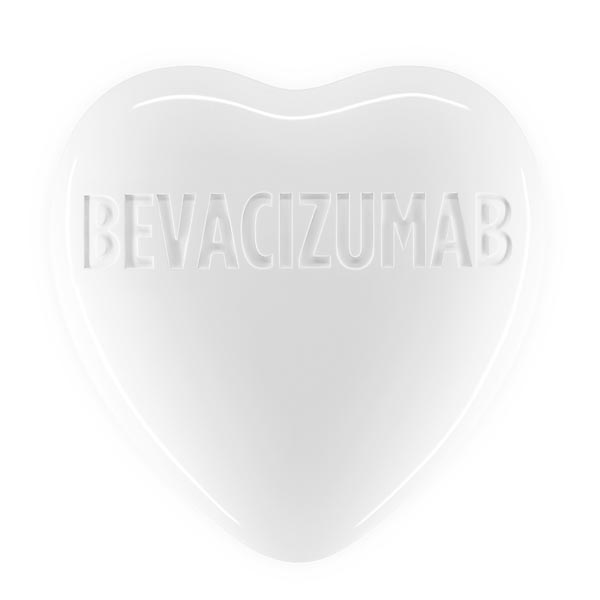
JIM RISWOLD
BEVACIZUMAB
2013 color digital print
33-1/2 x 33-1/2 inches, Edition of 10, $750.
24 x 24 inches, Edition of 10, $500.
Napoleone Ferrara invented Bevacizumab with the help of a cow.
In 1989, he found that something in the bovine pituitary gland caused blood
vessel cells to grow quicker than normal. He went on to isolate the gene and,
like any good scientist, called it something nobody could pronounce: vascular
endothelial growth factor or VEGF for short.
It led to an idea for a cancer drug based on a theory by Harvard’s Judah
Folkman that had been floating around the cancer world since 1971, namely
that since tumors need their own blood vessels to receive nourishment, choking
those vessels could, in essence, starve tumors to death.
Ferrara reasoned that if he could block VEGF, then cancer cells would not be
able to grow. So his colleagues at Genentech created a monoclonal antibody
that would bind to VEGF and stop it from doing its job.
In 2004, 15 years after Ferrara’s discovery, the FDA approved Bevacizumab
for combination use with standard chemotherapy for metastatic colon cancer.
A blockbuster was born.
It got a much catchier name: Avastin.
The cancer world, Genentech and Genentech shareholders thought they had a
miracle drug on their hands.
(Never mind the first trials of Bevacizumab to treat late-stage breast cancer
were complete failures and Genentech’s stock dropped 10% in one day.)
The word cure was bandied about. No less than Nobel laureate James Watson
proclaimed that it would lead to the cure of cancer within two years.
The FDA quickly approved it for the treatment of boatloads of other cancers:
non-small cell lung cancer in 2006, breast cancer in 2008, metastatic renal
cell cancer in July 2009 and recurrent glioblastoma multiforme in May 2009.
Genentech tested in trials for even more boatloads of cancers.
Avastin became the best-selling cancer drug in the world.
It also became one of the most expensive, costing up to $100,000 a year for
certain cancers.
But.
It hasn’t work as well as once hoped.
In 2011, after a lot of wrangling, the FDA went so far as to drop its approval of
Bevacizumab to treat breast cancer, because while it slowed tumor progression,
it did not prolong life or quality of life.
Recently, its efficacy in treating colon cancer and recurrent glioblastoma multiforme
has been questioned.
Instead of a cure, Bevacizumab has become a hope and an expensive prayer.